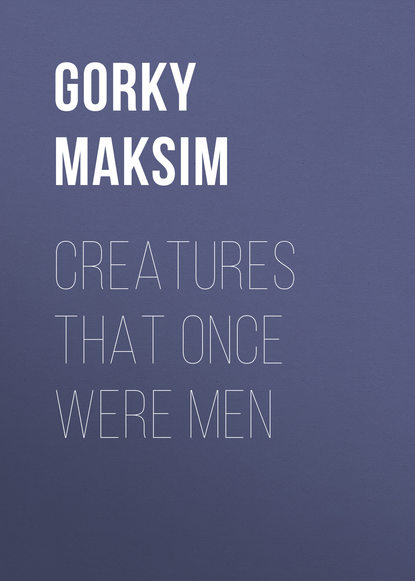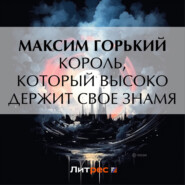По всем вопросам обращайтесь на: info@litportal.ru
(©) 2003-2024.
✖
Creatures That Once Were Men
Настройки чтения
Размер шрифта
Высота строк
Поля
The orator finished his speech and looked upon his hearers with his dark, pathetic eyes, seeming to apologize to them for some unknown crime.
The public understands it. They understand the morale of the creature who was once a man, the morale of the public-house and much misfortune.
"Well, brother Yashka, did you understand? See how true it is!"
Yakov understood that to beat her incautiously might be injurious to his wife. He is silent, replying to his companions' jokes with confused smiles.
"Then again, what is a wife?" philosophizes the baker, Mokei Anisimoff. "A wife.. is a friend if we look at the matter in that way. She is like a chain, chained to you for life.. and you are both just like galley slaves. And if you try to get away from her, you cannot, you feel the chain."
"Wait," says Yakovleff; "but you beat your wife too."
"Did I say that I did not? I beat her.. There is nothing else handy.. Do you expect me to beat the wall with my fist when my patience is exhausted?"
"I feel just like that too." says Yakov.
"How hard and difficult our life is, my brothers!
There is no real rest for us anywhere!"
"And even you beat your wife by mistake," some one remarks humorously. And thus they speak till far on in the night or till they have quarrelled, the usual result of drink or of passions engendered by such discussions.
The rain beats on the windows, and outside the cold wind is blowing. The eating-house is close with tobacco smoke, but it is warm, while the street is cold and wet. Now and then, the wind beats threateningly on the windows of the eating-house, as if bidding these men to come out and be scattered like dust over the face of the earth.
Sometimes a stifled and hopeless groan is heard in its howling which again is drowned by cold, cruel laughter. This music fills one with dark, sad thoughts of the approaching winter, with its accursed short, sunless days and long nights, of the necessity of possessing warm garments and plenty to eat. It is hard to sleep through the long winter nights on an empty stomach. Winter is approaching. Yes, it is approaching.. How to live?
These gloomy forebodings created a strong thirst among the inhabitants of the main street, and the sighs of the "creatures that once were men" increased with the wrinkles on their brows, their voices became thick and their behavior to each other more blunt. And brutal crimes were committed among them, and the roughness of these poor unfortunate outcasts was apt to increase at the approach of that inexorable enemy, who transformed all their lives into one cruel farce. But this enemy could not be captured because it was invisible.
Then they began beating each other brutally, and drank till they had drunk everything which they could pawn to the indulgent Vaviloff. And thus they passed the autumn days in open wickedness, in suffering which was eating their hearts out, unable to rise out of this vicious life and in dread of the still crueller days of winter.
Kuvalda in such cases came to their assistance with his philosophy.
"Don't lose your temper, brothers, everything has an end, this is the chief characteristic of life.
"The winter will pass, summer will follow.. a glorious time, when the very sparrows are filled with rejoicing." But his speeches did not have any effect – a mouthful of even the freshest and purest water will not satisfy a hungry man.
Deacon Taras also tried to amuse the people by singing his songs and relating his tales. He was more successful, and sometimes his endeavors ended in a wild and glorious orgy at the eating-house. They sang, laughed and danced, and for hours behaved like madmen. After this they again fell into a despairing mood, sitting at the tables of the eating-house, in the black smoke of the lamp and the tobacco; sad and tattered, speaking lazily to each other, listening to the wild howling of the wind, and thinking how they could get enough vodki to deaden their senses.
And their hand was against every man, and every man's hand against them.
PART II
All things are relative in this world, and a man cannot sink into any condition so bad that it could not be worse. One day, toward the end of September, Captain Aristid Kuvalda was sitting, as was his custom, on the bench near the door of the dosshouse, looking at the stone building built by the merchant Petunikoff close to Vaviloff's eating-house, and thinking deeply. This building, which was partly surrounded by woods, served the purpose of a candle factory.
Painted red, as if with blood, it looked like a cruel machine which, though not working, opened a row of deep, hungry, gaping jaws, as if ready to devour and swallow anything. The gray wooden eating-house of Vaviloff, with its bent roof covered with patches, leaned against one of the brick walls of the factory, and seemed as if it were some large form of parasite clinging to it. The Captain was thinking that they would very soon be making new houses to replace the old building. "They will destroy the dosshouse even," he reflected. "It will be necessary to look out for another, but such a cheap one is not to be found. It seems a great pity to have to leave a place to which one is accustomed, though it will be necessary to go, simply because some merchant or other thinks of manufacturing candles and soap." And the Captain felt that if he could only make the life of such an enemy miserable, even temporarily, oh! with what pleasure he would do it!
Yesterday, Ivan Andreyevitch Petunikoff was in the dosshouse yard with his son and an architect. They measured the yard and put small wooden sticks in various places, which, after the exit of Petunikoff and at the order of the Captain, Meteor took out and threw away. To the eyes of the Captain this merchant appeared small and thin. He wore a long garment like a frock-coat, a velvet cap, and high, well-cleaned boots. He had a thin face with prominent cheek-bones, a wedge-shaped grayish beard, and a high forehead seamed with wrinkles from beneath which shone two narrow, blinking, and observant gray eyes.. a sharp, gristly nose, a small mouth with thin lips.. altogether his appearance was pious, rapacious, and respectably wicked.
"Cursed cross-bred fox and pig!" swore the Captain under his breath, recalling his first meeting with Petunikoff. The merchant came with one of the town councillors to buy the house, and seeing the Captain asked his companion:
"Is this your lodger?"
And from that day, a year and a half ago, there has been keen competition among the inhabitants of the dosshouse as to which can swear the hardest at the merchant. And last night there was a "slight skirmish with hot words," as the Captain called it, between Petunikoff and himself. Having dismissed the architect the merchant approached the Captain.
"What are you hatching?" asked he, putting his hand to his cap, perhaps to adjust it, perhaps as a salutation.
"What are you plotting?" answered the Captain in the same tone. He moved his chin so that his beard trembled a little; a non-exacting person might have taken it for a bow; otherwise it only expressed the desire of the Captain to move his pipe from one corner of his mouth to the other. "You see, having plenty of money, I can afford to sit hatching it. Money is a good thing, and I possess it," the Captain chaffed the merchant, casting cunning glances at him. "It means that you serve money, and not money you," went on Kuvalda, desiring at the same time to punch the merchant's belly.
"Isn't it all the same? Money makes life comfortable, but no money,".. and the merchant looked at the Captain with a feigned expression of suffering. The other's upper lip curled, and exposed large, wolf-like teeth.
"With brains and a conscience, it is possible to live without it. Men only acquire riches when they cease to listen to their conscience.. the less conscience the more money!"
"Just so; but then there are men who have neither money nor conscience."
"Were you just like what you are now when you were young?" asked Kuvalda simply. The other's nostrils twitched. Ivan Andreyevitch sighed, passed his hand over his eyes and said:
"Oh! When I was young I had to undergo a great many difficulties .. Work! Oh! I did work!"
"And you cheated, too, I suppose?"
"People like you? Nobles? I should just think so!
They used to grovel at my feet!"
"You only went in for robbing, not murder, I suppose?" asked the Captain.
Petunikoff turned pale, and hastily changed the subject.
"You are a bad host. You sit while your guest stands."
"Let him sit, too," said Kuvalda.
"But what am I to sit on?"
"On the earth.. it will take any rubbish."
"You are the proof of that," said Petunikoff quietly, while his eyes shot forth poisonous glances.
And he went away, leaving Kuvalda under the pleasant impression that the merchant was afraid of him. If he were not afraid of him he would long ago have evicted him from the dosshouse.
But then he would think twice before turning him out, because of the five roubles a month. And the Captain gazed with pleasure at Petunikoff's back as he slowly retreated from the court-yard. Following him with his eyes, he noticed how the merchant passed the factory and disappeared into the wood, and he wished very much that he might fall and break all his bones. He sat imagining many horrible forms of disaster while watching Petunikoff, who was descending the hill into the wood like a spider going into its web. Last night he even imagined that the wood gave way before the merchant and he fell.. but afterward he found that he had only been dreaming.
And to-day, as always, the red building stands out before the eyes of Aristid Kuvalda, so plain, so massive, and clinging so strongly to the earth, that it seems to be sucking away all its life. It appears to be laughing coldly at the Captain with its gaping walls. The sun pours its rays on them as generously as it does on the miserable hovels of the main street.
"Devil take the thing!" exclaimed the Captain, thoughtfully measuring the walls of the factory with his eyes. "If only.." Trembling with excitement at the thought that had just entered his mind Aristid Kuvalda jumped up and ran to Vaviloff's eating-house muttering to himself all the time.
Vaviloff met him at the bar and gave him a friendly welcome.
"I wish your honor good health!" He was of middle height and had a bald head, gray hair, and straight mustaches like tooth-brushes. Upright and neat in his clean jacket, he showed by every movement that he was an old soldier.

















